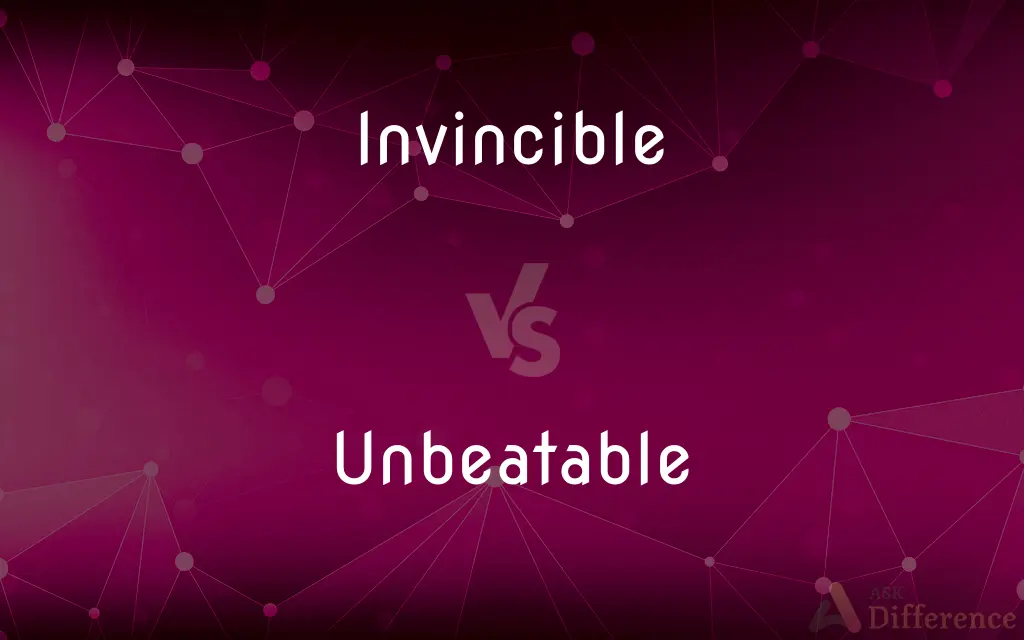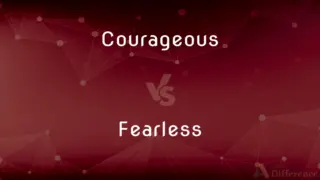Invincible vs. Unbeatable — What's the Difference?
By Tayyaba Rehman & Urooj Arif — Updated on March 24, 2024
Invincible implies an inability to be overcome or defeated in any context, often used metaphorically. Unbeatable specifically denotes an entity that cannot be outperformed or defeated in a competition or challenge.

Difference Between Invincible and Unbeatable
Table of Contents
ADVERTISEMENT
Key Differences
Invincibility suggests a broader, more abstract quality of being impossible to defeat or overcome, transcending physical battles to include challenges in various life aspects. It connotes a sense of absolute resilience and enduring strength that cannot be broken or subdued, regardless of the situation. Unbeatable, on the other hand, is often applied in scenarios involving competition, contests, or challenges, where one party emerges victorious over others. It emphasizes supremacy in performance or capability in specific contexts, such as games, sports, or intellectual pursuits.
While invincibility carries a more permanent and inherent characteristic, suggesting that defeat is out of the question under any circumstances, unbeatable may be more temporal or context-dependent. An unbeatable record or competitor today might be surpassed tomorrow, reflecting the dynamic nature of competition and progress. In contrast, something invincible, whether it be a fortress, a spirit, or an idea, is perceived as eternally impregnable.
The concept of invincibility often has a mythological or fantastical connotation, evoking images of superheroes, gods, or legendary creatures that cannot be conquered or destroyed. It taps into the human fascination with the extraordinary and the eternal. Unbeatable, whereas, is grounded more in reality and practical experiences, relating to tangible achievements and measurable superiority.
In literature and rhetoric, invincibility is used to dramatize and elevate the subject, imbuing it with a grand, almost mystical quality. Unbeatable, on the other hand, is used to describe excellence and dominance in a more relatable and comprehensible manner, often inspiring motivation and admiration for peak performance or skill.
Both terms, while similar, serve different narrative and descriptive purposes, reflecting the nuanced spectrum of human achievement, aspiration, and the timeless pursuit of surpassing limits, whether they be literal or metaphorical.
ADVERTISEMENT
Comparison Chart
Definition
Impossible to defeat or overcome in any context.
Cannot be outperformed or defeated in a competition or challenge.
Scope
Broad and abstract, can apply to various life aspects.
Specific to competitions, contests, or challenges.
Temporality
Suggests a permanent, inherent characteristic.
May be temporal or context-dependent.
Connotation
Often mythological or fantastical, evoking a sense of eternal resilience.
Grounded in reality, related to tangible achievements and superiority.
Usage in Literature
Used to dramatize and elevate, imbuing subjects with a mystical quality.
Describes excellence and dominance in a relatable manner.
Compare with Definitions
Invincible
Incapable of being conquered, defeated, or subdued.
The ancient hero was considered invincible, with no enemy able to stand in his way.
Unbeatable
Incapable of being surpassed or outdone in a specific competition or field.
The team's record this season has been unbeatable.
Invincible
Endowed with a quality that prevents defeat in any situation.
Her invincible spirit kept her going, even in the toughest times.
Unbeatable
Holding a position of superiority that has not yet been overcome.
Her time in the 100m dash remains unbeatable.
Invincible
Unassailable, withstanding all challenges or attacks.
The fortress was believed to be invincible, never having fallen to an enemy.
Unbeatable
The best available option or choice, often in a consumer context.
This deal is unbeatable; you won't find a lower price anywhere.
Invincible
Impervious to harm or failure, often in an abstract sense.
With an invincible attitude, he faced every challenge head-on.
Unbeatable
Having a track record of success that others have not yet matched.
His unbeatable streak in chess tournaments is legendary.
Invincible
Mythical or supernatural in being unbeatable.
In the stories, the sword granted the wielder invincible powers.
Unbeatable
In a competitive context, having no known equals.
In terms of performance, this new model is unbeatable.
Invincible
Incapable of being overcome or defeated; unconquerable.
Unbeatable
Impossible to defeat or surpass
An unbeatable team.
An unbeatable sales record.
Invincible
To defeat, destroy, or kill; too powerful to be defeated or overcome.
Unbeatable
That cannot be beaten, defeated or overcome
Invincible
Someone or something that cannot be defeated, destroyed, or killed.
Unbeatable
Someone or something that can't be beaten
Invincible
Incapable of being conquered, overcome, or subdued; unconquerable; insuperable; as, an invincible army, or obstacle.
Lead forth to battle these my sonsInvincible.
Unbeatable
Hard to defeat;
An unbeatable ball team
Invincible
Incapable of being overcome or subdued;
An invincible army
Her invincible spirit
Unbeatable
Incapable of being overcome or subdued;
An invincible army
Her invincible spirit
Common Curiosities
Is "unbeatable" only relevant in sports?
No, it can apply to any competitive scenario, including business, gaming, or even product pricing.
Does "invincible" imply no effort is needed to maintain that status?
Not necessarily. While it implies a strong inherent quality, maintaining an invincible status, especially in a metaphorical sense, can require continuous effort and resilience.
Does "unbeatable" mean no one will ever surpass it?
Not necessarily; it means that up to that point, no one has been able to do so, but it's possible in the future.
Can "invincible" be used to describe a team?
Yes, although it's more dramatic and implies a near-mythical level of superiority, not just in a single season or competition.
Can a person's will or spirit be described as "invincible"?
Yes, "invincible" can describe non-physical qualities, such as determination or resilience, that cannot be overcome.
Is it hyperbolic to use "invincible" in everyday situations?
It can be, as "invincible" often carries a weighty, dramatic connotation that might be too strong for mundane contexts.
Are "invincible" and "unbeatable" interchangeable?
While they share similarities, they're not always interchangeable due to the different nuances and contexts they imply.
Can a product be "invincible"?
While "invincible" can be used metaphorically in marketing, it's more common to use "unbeatable" to describe a product's superiority in its category.
Can something be "unbeatable" at one point but not at another?
Yes, "unbeatable" often implies superiority within a specific timeframe or under certain conditions, which can change.
Can "unbeatable" apply to personal skills or talents?
Yes, if someone's skills or talents are currently unmatched in their field, they could be described as "unbeatable."
Share Your Discovery

Previous Comparison
Courageous vs. Fearless
Next Comparison
Lout vs. ToutAuthor Spotlight
Written by
Tayyaba RehmanTayyaba Rehman is a distinguished writer, currently serving as a primary contributor to askdifference.com. As a researcher in semantics and etymology, Tayyaba's passion for the complexity of languages and their distinctions has found a perfect home on the platform. Tayyaba delves into the intricacies of language, distinguishing between commonly confused words and phrases, thereby providing clarity for readers worldwide.
Co-written by
Urooj ArifUrooj is a skilled content writer at Ask Difference, known for her exceptional ability to simplify complex topics into engaging and informative content. With a passion for research and a flair for clear, concise writing, she consistently delivers articles that resonate with our diverse audience.














































